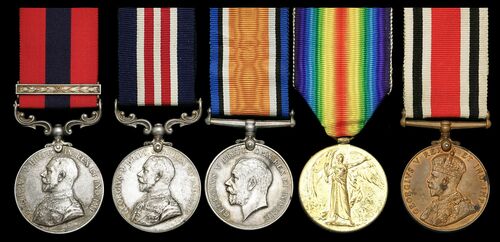
Auction: 24001 - Orders, Decorations and Medals
Lot: 184
A Great War D.C.M. & 'Battle of Cambrai' Second Award Bar, M.M. group of four to Sergeant F. A. Godfrey, Royal Munster Fusiliers, who was wounded in action and in his first citation was quoted as saying '...it is nothing' and carrying on the fight having been shot in the arm, he was later mortally wounded at Battle of Cambrai, having won his Second Award Bar in the action
Distinguished Conduct Medal, G.V.R. with second award bar (9083 Cpl F. Godfrey. 2/R. Muns: Fus); Military Medal, G.V.R. (1-9083 Cpl F. A. Godfrey. 1/R.M.Fus:); British War and Victory Medals (9083 Sjt. F. Godfrey. R. Mun. Fus.), good very fine and almost certainly a Regimentally unique combination (5)
Approximately 63 D.C.M.'s and just 2 Second Award Bars to the D.C.M. to the Royal Munster Fusiliers for the Great War, thus likely unique in combination with his M.M.
D.C.M. London Gazette 20 October 1916, the original citation states:
'For conspicuous gallantry and devotion to duty. During an attack he was wounded, by saying "It is Nothing", led and cheered on two further attacks. When they finally broke down, owing to heavy machine-gun fire, he was, with difficulty, restrained from going on by himself.'
Second Award Bar to the D.C.M. London Gazette 2 December 1919, the original citation states:
'For conspicuous gallantry and devotion to duty. During the attack on Proville, South of Cambrai, on the 30th September 1918, he was wounded while his company was crossing the canal bridge. He refused to go back and be dressed but went to the assistance of other wounded, and saved some from being drowned. he then got his company across the canal, and all the Officers being wounded, led them to the attack. He was wounded three times before he eventually left the company. He behaved splendidly.'
M.M. London Gazette 13 March 1918.
Frederick Arthur Godfrey was born at Putney in 1890 although records are mixed as to where and when he was born and he may have been underage when he enlisted, doing so in Portsmouth. The 1st Munsters were stationed in Rangoon, Burma, as part of the Imperial garrison, but also divided between smaller units posted around islands in the Indian Ocean.
As part of the policy of recalling regular units, the Battalion returned to Britain to reinforce the British Expeditionary Force. Arriving in January 1915, they joined the 86th Brigade at Coventry, as part of the 29th Division. At the time the 29th Division was Britain's only reserve ready for action.
Godfrey did not see service in Gallipoli and from official records first served in France in May 1916 , there is no exact confirmation on his M.I.C. However a casualty list in the Coventry Evening News dated to 1915 notes a man with his surname, service number and initial being wounded in the Dardanelles. The casualty records state that he suffered a gun shot wound to the arm on 25 August 1916, this being the injury given the citation for his first DCM is where he won his medal.
The Battle of Cambrai
Extracts from the War Diary of 1st Battalion, Royal Munster Fusiliers, written by Major Nightingale, state:
27 September 1918
The Bn attacked across the open and advanced about 3000 yds and were finally held up in front of CANTAING village, partly by Machine Gun fire and partly by our own artillery barrage, which had not lifted sufficiently to allow our men to gain a footing in the village. The Bn remained where it was during the night.
28 September 1918
Cooperation having been made with the artillery, a barrage was put down in the morning and the Bn captured the village of CANTAING, and troops of another Bn went through them. The Bn remained in CANTAING village.
29 September 1918
Orders were received that the Bn was to proceed forward from CANTAING the following day and recapture part of the outskirts of CAMBRAI
30 September 1918
5.30am The Bn moved forward crossing the St.Quentin canal and moving in artillery formation towards the objective. The Bn was held up by machine gun fire from PROVILLE.
12.00 Noon With the help of artillery barrage, the Bn was able to move forward and took up a line of post in the suburb of PROVILLE, on the outskirts of CAMBRAI. After this operation the Bn numbered about 10 officers and 150 other ranks - at 1.30pm Lt Col Kane was mortally wounded endeavouring to reorganise some detached parties of men and head them into the attack.
4PM Owing to enemy counter-attack a post was lost and a CSM taken prisoner, but with the aid of the Anson Bn of the 63rd Naval Division, this post was re-taken by 5pm.
6PM the advanced posts were withdrawn and a line taken up just in rear of the position and was held by the Bn throughout the night until relieved by the 170th Bde.
Godfrey died of wounds on the 2 October 1918 and is buried in the Sunken Road Cemetery, Boisleux-St.Marc, France. He was the son of Frederick Godfrey of 298 London Road, Isleworth, Middlesex.
The lot includes a Special Constabulary Long Service and Good Service Medal, G.V.R. crowned head (Frank Godfrey.), brother of F. A. Godfrey.
Subject to 20% VAT on Buyer’s Premium. For more information please view Terms and Conditions for Buyers.
Sold for
£10,000
Starting price
£2200




